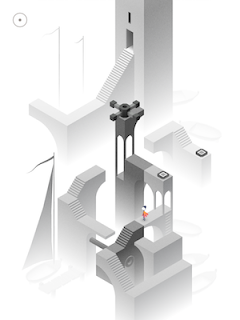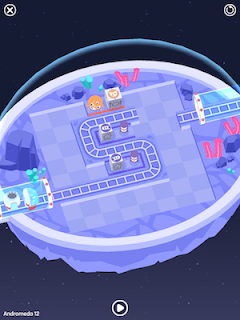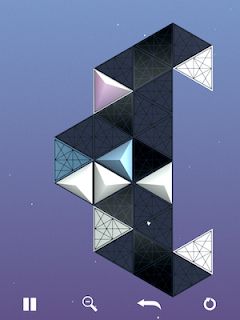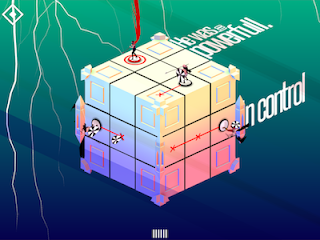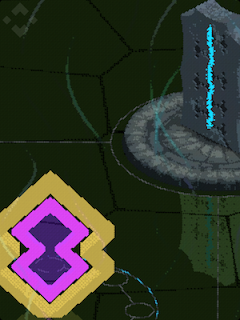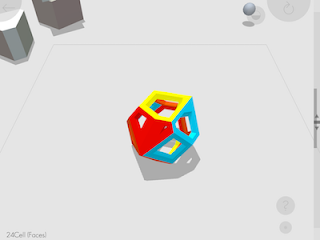Tough mobile puzzle games
Monday, June 19, 2017
Comments: 2 (latest 1 day later)
Tagged: monument valley, reviews, puzzles, euclidean lands, raster prime, 4d toys, cosmic express, yankai's triangle
Monument Valley 2 shipped, and needs no net-boosting from me. It was mentioned in Apple's WWDC keynote; that's max visibility in ten seconds.
I played MV2, and indeed it was as lovely and finger-satisfying as the original. But, like the original, it wasn't particularly puzzle-intense. Once you locate all the movable objects on the screen, move them, and see how they match up, you've done most of the job. Which is fine: the creators are clearly aiming at the general audience, not at puzzle fiends.
So, the question: what recent puzzle games are as pretty and whimsical as MV2, but will also melt your brain out your ears?
Cosmic Express has a deceptively simple-looking mechanic (the kind we all seek!) You lay out a train-track; the train moves around, picking up cute aliens and dropping them in boxes. Or "homes", but I dare you to think of them as anything but package deliveries after the first few levels.
The system is entirely deterministic. Aliens take the first available train car and debark at the first matching box. That makes the game sound simple. Well, so does a description of a Rubik's Cube. Running the train past all the things in the right order, constrained by the grid, can be inordinately tricky; and there are often several possible "right orders" to try. Most ideas you have are either nearly possible or nearly impossible, which is a delightful balance to discover in a game.
Plus, Cosmic Express has a lot of levels. I didn't count, but over a hundred. A few mechanics variations are deployed with deadly efficiency, and then (if you manage to clear the universe) some of the levels flip into extra-hard mode with a bonus constraint. The game took me a month of dedicated fussing to finish, and I never did solve most of the extra-hard levels. So that definitely meets the "melt brain" criterion.
Yankai's Triangle was a stylish but not-very-interesting geometric puzzle game which appeared last year. The mechanic was a familiar color-matching puzzle livened up by unbounded nesting, but it didn't take long to start feeling same-ish. The designer (local Boston dev!) has now followed up, and raised the bar, with Yankai's Peak. This has an entirely new and quite enchanting mechanic, in which pyramids push other pyramids around in a physics-feeling (but grid-constrained) way.
The game isn't large -- I spent about a week finishing it -- but some of the levels require a lot of thoughtful experimentation. The mechanic isn't quite intuitive, so learning it is part of the challenge; and then you have to figure out the variations which appear with each new set of levels. So it has more of a mystery-box feeling than the usual grid-based puzzle game. I was also pleased by the ending, which is a bit more mechanically satisfying than the usual "100%" or "You walk off into the sunset" puzzle wrap-ups.
I have a few quibbles with the UI (do you really want to use uncomfortable jitters to indicate that a piece is in the right spot?). I'd also say that the mechanics could have supported many harder puzzles -- it could have rivalled Cosmic Express -- but again, you pick your difficulty for your target audience. Overall this is a winner.
(I don't know if the designer intends to continue the series with "Yankai's 5-Cell", but I'm all there for it...)
Euclidean Lands (nice title!) is a clever puzzle where you walk around on Rubik's Cube, positioning yourself to backstab goons. It's attractive and it's got the three-axis geometric wackiness which makes the Monument Valley series so wonderfully disorienting.
Unfortunately, Euclidean Lands goes way too far, at least for me. It has boss levels where you cannot rotate the cube-world freely. Instead, the world rotates itself every time you move, based on the direction of your motion. This spikes the difficulty of those levels way up. Maybe I could have adjusted if it had gone there in a smooth curve, but by scattering the autorotate levels into a generally low-stress sequence, the game threw me right off the horse. Plus, you can make fatal mistakes (goons attack on sight) and there's no undo! So experimentation is even more painful than you might expect.
Full marks for brain-melting, but trying to work through the hard levels is frustrating, not fun. That's a problem. I tossed the game halfway through.
Raster Prime is another mystery-box -- no instructions; you have to experiment until it says "yay". I like those, but it means I can't go into detail without spoiling the game.
On the down side, it has a pixel-art style, which I am generally tired of. (I do appreciate that the pixels are cut on the bias -- that's a distinctive twist.)
And while the mechanic gets harder in later levels, it doesn't get harder in an interesting way. The clues are just harder to parse, and (I think) sometimes ambiguous. You wind up trying each puzzle several times; if it doesn't say "yay" you're not sure whether you interpreted the clues wrong or just made a mistake. The result is less fun than it should be, and I gave up before finishing the game.
Finally, I have to mention 4D Toys, which isn't hard in the puzzle sense because it's not a puzzle game. I mean, it's not a game, it's a sandbox full of four-dimensional geometry. It's got a basic intro to the subject (much like the deft Fourth Dimension app a few years ago), but mostly you just fling 4D shapes around the screen and see how they bounce off each other. If you didn't understand that 5-cell comment earlier, here's your chance!
This will either be boring or set your head on fire, depending on whether you think 4D shapes are worth thinking about. I am a fan, of course. I discovered several shapes I didn't know about, like the duocylinder and its extruded edge, the "tiger". Flinging around the 5-caltrop and seeing how it comes to rest was also enlightening.
UI quibbles: I really wanted gestures to rotate an object on its other (non-obvious) axes. You can do two- and three-finger twists to rotate an object the normal ways, but to make it go the other ways you have to bonk it into things, which is clumsy and unsatisfying.
Now we just have to wait for the author to finish Miegakure. Remember that? Yeah.


